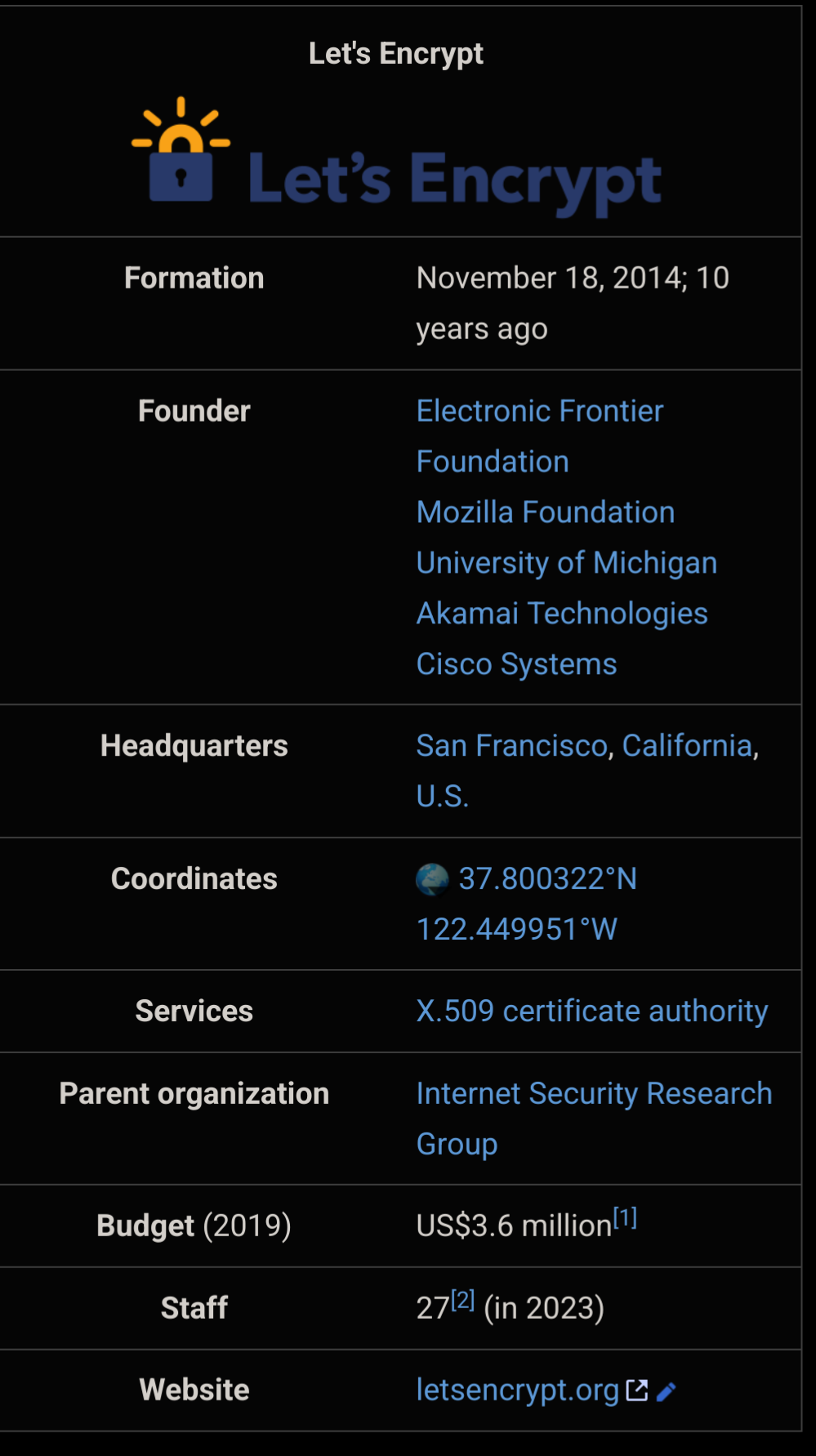- cross-posted to:
- selfhosting@slrpnk.net
- selfhosted@lemmy.world
- cross-posted to:
- selfhosting@slrpnk.net
- selfhosted@lemmy.world
Happy birthday to Let’s Encrypt !
Huge thanks to everyone involved in making HTTPS available to everyone for free !

I worked for a company we had 300 websites, the boss wanted to buy certs. I told him about Lets Encrypt. He loved the idea it saved us a bunch of money. I suggest we donate $100 to them. Hes says “NO F-ing way!”.
Man I love let’s encrypt, remember how terrible ssl was before the project landed?
A client of mine pays for an SSL cert he doesn’t even use. I’ve told him before I moved him to Let’s Encrypt because I was able to automate the renew process. He decided he needed to continue paying for the SSL cert. I told him we are not using it, but he doesn’t believe me. So he continues to pay for it.
Sleeping too well lately? Consider this:
If LetsEncrypt were to suffer a few weeks outage, how much of the internet would break?
If you have a fully automated setup. Youll have 30 days to mitigate the fallout.
It won’t be that simple.
For starters, you’re assuming t-zero response. It’ll likely be a week before people worry enough that LE isn’t returning before they act. Then they have to find someone else for, possibly, the hundreds or thousands of certs they are responsible for. Set up processes with them. Hope that this new provide is able to cope with the massive, MASSIVE surge in demand without falling over themselves.
And that’s assuming your company knows all its certs. That they haven’t changed staff and lost knowledge, or outsourced IT (in which case they provider is likely staggering under the weight of all their clients demanding instant attention) and all that goes with that. Automation is actually bad in this situation because people tend to forget how stuff was done until it breaks. It’s very likely that many certs will simply expire because they were forgotten about and the first thing some companies knows is when customers start complaining.
LetsEncrypt is genuinely brilliant, but we’ve all added a massive single point of failure into our systems by adopting it.
(Yeah, I’ve written a few disaster plans in my time. Why do you ask?)
Piggybacking off this comment because I completely agree with it.
Did we not learn anything from CrowdStrike? If a comparatively simple fix was able to wipe out half the world, how would something that requires an active choice (where to get certs from) not completely cripple all of our infrastructure?
Let’s Encrypt is amazing, but are there any equally trustworthy alternatives people could switch to if something bad happens to it?
They came up with the ACME protocol, so presumably somebody could. The real barrier to entry is the cost of getting into that certificate chain of trust. I have no idea why it’s so difficult and expensive.
Well, it’s difficult, as it should be, because if you control a certificate in the active chain of trust of browsers, you can hack pretty much anything you want.
Correct me if I’m wrong, but isn’t the CA only signing your public key to prove identity/authority? I don’t think the CA can magically MITM every cert they sign.
The impact is not serious enough to warrant a $1m entry fee, IMO. At best, someone could impersonate a site. They’d also have to get other things in line (e.g. DNS hijacking) to be at all successful anyway. And it’s not like most people are authenticating certs themselves. They just trust browsers to trust CAs that vouch for you and prevents those scary browser warnings.
It doesn’t improve encryption compared to a self-signed cert though.
If you are the CA, you can sign a new certificate yourself for google.com and the browser will accept it. It’s effectively allows MITM for any certificate. Worse, it’s not even limited to certificates under that CA. The browser has no way of knowing there’s 2 “valid” certs at once, and in fact that is allowed regardless (multiple servers with different instances of the SSL cert is a possibility).
Certificate pinning might save things, since that will force the same certificate as was previously used, but I’m not sure this is a common default.
If it begins to enshitify, someone will quickly take up the helm. It’s become so core now that someone like Cloudflare would just be like “We do this now.”
I think Cloudflare enshittifying is a bigger risk that Let’s Encrypt.








